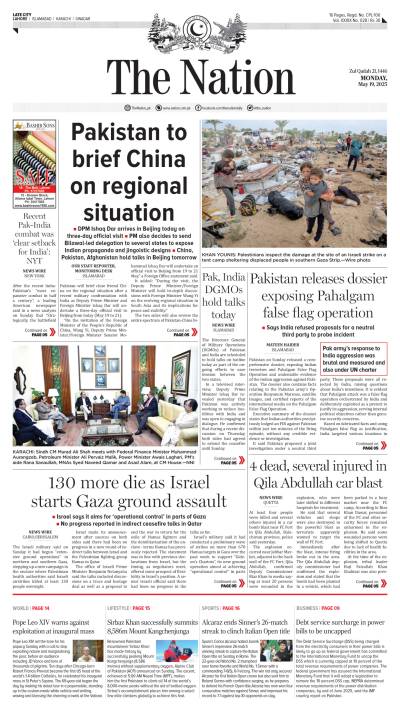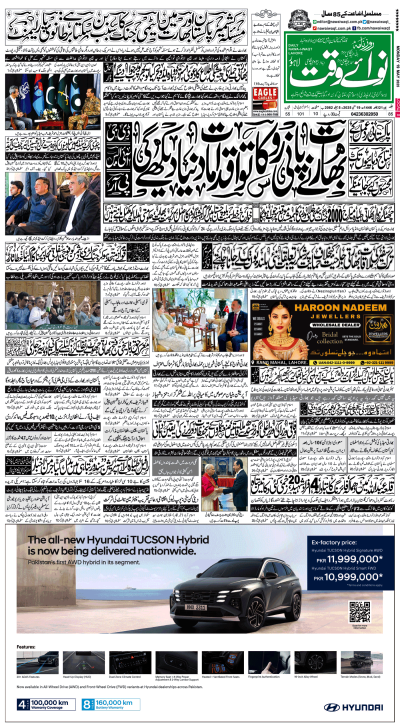The Karachi crisis has reached a boiling point. If timely steps are not taken to resolve the issue, it may have devastating consequences for the country. Once commonly known as the ‘City of Lights’, it has been pushed into the darkness of enmity, hatred, revenge and bitterness. A sense of insecurity and lawlessness prevails there. The hope for peace, security and justice is fading rapidly.
Target killings in Karachi have become a norm. After every violent incident, the politicians express their deep sympathy and condolences to the victims’ families and condemn it. However, little effort is made to bring the criminals to justice. Also, unfortunately, a serious action by the relevant authorities is missing. Apparently, both the federal and provincial governments lack either the will or courage to do much about it. If we analyse past media reports, it is evident that most of the violent acts/crimes are politically-motivated. There seems to be a continuous struggle for power between the PPP, MQM, ANP, Sindh nationalists and some religious groups. Land grabbers, kidnappers, and weapon and drug mafias are also contributing to the bad law and order situation. Last but not least, the foreign elements are taking advantage of this situation to destabilise Pakistan. So, who should be held responsible for the lawlessness in country’s financial hub? Obviously, the government!
Last week, for instance, the attack on a rally organised by the Sindh Awami Tehrik against the proposed creation of a Mohajar province left 12 people killed and at least 30 injured. The government should have provided full security cover to the rally, even if the organisers did not obtain prior permission. Especially, if one party or an ethnic group is allowed to organise rallies, then why not others?
Needless to say, the announcement for the creation of the Seraiki province has initiated the demand for new provinces. Creating new federating units for better administrative management, economic development and prosperity of the public is not a bad idea. However, the sensitivity of the issue demands that it should be analysed in a broader perspective. Initially, a Commission should be established and the issue debated threadbare. The politicians must not exploit the issue for political point-scoring.
Taking notice of the killings in Karachi, CM Sindh established a Judicial Commission, headed by a judge of the Sindh High Court, to probe into the matter. Likewise, the federal government formed a Committee comprising four Federal Ministers, headed by Amin Fahim. It is a fact that when government’s lack political will to deal with issues, they constitute committees and eventually matters are pushed under the carpet. Hence, to bring permanent peace to Karachi, here are some suggestions:
a All stakeholders need to demonstrate their sincerity and seriousness about the Karachi situation.
a Political parties must commit to eliminate the criminal elements from their ranks.
a Appointment of a full-time Home Minister to look after the law and order of the city.
a More powers should be extended to the police and rangers to maintain the law and order.
a Depoliticise the police force.
a Increase the number of police force, according to the city’s population, as presently over 50 percent of the force is deployed for the protocol and security of the politicians and other VIPs.
a Modern training and technology, including sophisticated weapons and communication systems, must be provided to the police. Unfortunately, the police during the Lyari Operation was not as equipped as the criminals, creating a serious threat to their lives and that of the public.
a Close coordination among secret agencies looking after the state’s security and the timely exchange of information between them is must.
a The government, its coalition partners and the people need to support the police or rangers against those who are involved in heinous crimes. Nobody should try to protect them.
Finally, we must remember that no plan or policy can be successful, unless the people at the helm of affairs are not sincere. The political forces in Karachi must advice their workers and supporters to show tolerance in dealing with each other, regardless of the language they speak or the province/city they belong to. Karachi is Pakistan and all Pakistanis have an equal right on the city’s resources; no individual or political party can claim that it has more rights than others.
The writers is broadcast journalist.
Email: waheed.h35@gmail.com
Tuesday, May 20, 2025
Karachi’s need for a solution
Dar in China as Pakistan intensifies diplomatic push against India’s narrative
5:37 PM | May 19, 2025
Peace advocate urges renewed global engagement on Kashmir conflict
4:57 PM | May 19, 2025
'India is not US, Pakistan is not Afghanistan': ISPR delivers stern warning to India
4:32 PM | May 19, 2025
-
Lahore emerges among safest global cities in Numbeo 2025 index
-
Lahore emerges among safest global cities in Numbeo 2025 index
-
India’s suspension of Indus Water Treaty legally baseless
-
Seventh polio case reported in Pakistan amid nationwide vaccination drive
-
Pakistan reports sixth polio case of 2025
-
PTA begins issuing VPN licences to regulate usage
Regional Reset
May 19, 2025
Peak Potential
May 19, 2025
United Front
May 19, 2025
Culture Shift
May 18, 2025
Tactical Shift
May 18, 2025
Pakistan’s Strategic Edge
May 19, 2025
Lessons for India
May 19, 2025
Galiyat’s Poor Network Services
May 19, 2025
A City in Neglect
May 19, 2025
Rising Cost of Living
May 19, 2025
ePaper - Nawaiwaqt
Nawaiwaqt Group | Copyright © 2025





